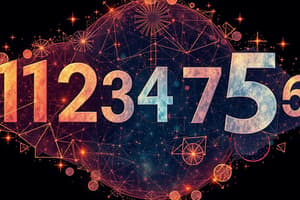Podcast
Questions and Answers
Which of the following is not a type of number classified under real numbers?
Which of the following is not a type of number classified under real numbers?
- Integer
- Complex (correct)
- Rational
- Irrational
What is the result of rounding the number 7.346 to one decimal place?
What is the result of rounding the number 7.346 to one decimal place?
- 7.3
- 7.7
- 7.0
- 7.4 (correct)
In the number 57231, what is the place value of the digit 2?
In the number 57231, what is the place value of the digit 2?
- 20 (correct)
- 2,000
- 2
- 200
Which of the following numbers is classified as a rational number?
Which of the following numbers is classified as a rational number?
What happens when you round the number 42.444 to the nearest whole number?
What happens when you round the number 42.444 to the nearest whole number?
In which of the following scenarios would a number be considered an integer?
In which of the following scenarios would a number be considered an integer?
If you were to round the number 54,872 to the nearest thousand, what would it be?
If you were to round the number 54,872 to the nearest thousand, what would it be?
Which digit in the number 50,208 is in the hundred thousands place?
Which digit in the number 50,208 is in the hundred thousands place?
Flashcards
Natural Numbers
Natural Numbers
Positive whole numbers used for counting (1, 2, 3, etc.)
Whole Numbers
Whole Numbers
Natural numbers including zero (0, 1, 2, 3, etc.)
Integers
Integers
Whole numbers and their negative counterparts (…-3, -2, -1, 0, 1, 2, 3, etc.)
Rational Numbers
Rational Numbers
Signup and view all the flashcards
Irrational Numbers
Irrational Numbers
Signup and view all the flashcards
Real Numbers
Real Numbers
Signup and view all the flashcards
Complex Numbers
Complex Numbers
Signup and view all the flashcards
Rounding Whole Numbers
Rounding Whole Numbers
Signup and view all the flashcards
Rounding Decimals
Rounding Decimals
Signup and view all the flashcards
Place Value
Place Value
Signup and view all the flashcards
Digit Position
Digit Position
Signup and view all the flashcards
Study Notes
Types of Numbers
- Natural numbers: Positive integers (1, 2, 3, ...). These are the counting numbers.
- Whole numbers: Include zero and all natural numbers (0, 1, 2, 3, ...).
- Integers: Include zero, positive and negative whole numbers (... -3, -2, -1, 0, 1, 2, 3, ...).
- Rational numbers: Numbers that can be expressed as a fraction p/q, where p and q are integers and q ≠ 0. Examples include 1/2, 3/4, -2/5. Terminating or repeating decimals are rational numbers.
- Irrational numbers: Numbers that cannot be expressed as a fraction of two integers. These numbers have non-repeating, non-terminating decimal representations. Examples include √2, π.
- Real numbers: The set of all rational and irrational numbers.
- Complex numbers: Numbers that can be expressed in the form a + bi, where a and b are real numbers and i is the imaginary unit (√-1).
Rounding Off Whole Numbers
- Identify the place value to which you want to round.
- Look at the digit to the right of the place value.
- If it is 5 or greater, round up the digit in the place value.
- If it is 4 or less, keep the digit in the place value the same.
- Drop all the digits to the right of the place value.
Rounding Off Decimals
- Identify the place value to which you want to round.
- Look at the digit to the right of the place value.
- If it is 5 or greater, add 1 to the digit in the rounding place value.
- If it is 4 or less, keep the digit in the place value the same.
- Drop all the digits to the right of the place value.
Place Value
-
Place value refers to the value of a digit in a number based on its position.
-
Each position in a number represents a specific power of 10.
-
The value of a digit is determined by multiplying the digit by the power of 10 corresponding to its place value position.
-
For example, in the number 345, the digit 3 is in the hundreds place, the digit 4 in the tens place, and the digit 5 in the units place. So the value of 3 is 300 in this example.
-
Understanding place value is fundamental for performing arithmetic operations, comparing numbers, and understanding number systems.
-
Place values increase from right to left.
-
Examples of place value charts and positions: units, tens, hundreds, thousands, ten thousands, hundred thousands, millions, etc.
-
A zero in a place value position indicates the absence of that value in the number. Example: 302; the zero in the tens place indicates absence of tens (zero tens).
-
Positional value (or place value) of digits in the system is determined by the position occupied in the digits. The value of a digit in a number depends on its position in the number. The digits in the number 222 each have a different place value.
Studying That Suits You
Use AI to generate personalized quizzes and flashcards to suit your learning preferences.




